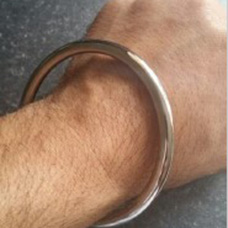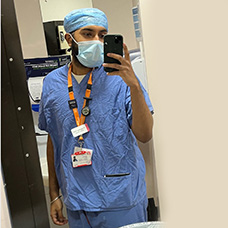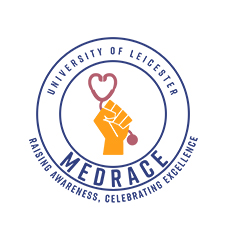College of Life Sciences
Working together towards active inclusion within surgery
Amardeep Sidki, Student, Leicester Medical School
I was on my surgical rotation and had just helped consent a patient for surgery - next stop, the operating room. The Operating Department Practitioners (ODPs) and Anaesthetics team had prepared the patient, so it was time for us to scrub up. Everyone close to the operating field must scrub up, this involves wearing a sterile surgical gown, hats and gloves after thorough hand washing.
 I am a Sikh man; part of my religious identity includes wearing the kara, a metal bangle which represents one’s unbreakable bond with God. When washing my hands, the surgeon told me to take my kara off and place it in my pocket. I said I cannot take it off. He told me I would not be able to enter the operating room if I wore one and that if I wanted to have a career in surgery that I would have to abide by this due to the infection control risk. I refused to do this and did not attend any more of his surgeries. My own beliefs were being disregarded in that moment and I essentially had the choice of maintaining my identity or missing out on a learning opportunity. I was surprised by this especially occurring in Leicester, a city celebrated for its diversity.
I am a Sikh man; part of my religious identity includes wearing the kara, a metal bangle which represents one’s unbreakable bond with God. When washing my hands, the surgeon told me to take my kara off and place it in my pocket. I said I cannot take it off. He told me I would not be able to enter the operating room if I wore one and that if I wanted to have a career in surgery that I would have to abide by this due to the infection control risk. I refused to do this and did not attend any more of his surgeries. My own beliefs were being disregarded in that moment and I essentially had the choice of maintaining my identity or missing out on a learning opportunity. I was surprised by this especially occurring in Leicester, a city celebrated for its diversity.
I went home that day feeling disappointed and angry. I researched the local NHS policy, which at the time stated that a kara ‘is to be removed or secured by tapes above the elbow’. This clearly was an example of a policy created without consulting the people it will affect, as a kara practically cannot even reach anywhere close to the elbow - without seriously compromising comfort and blood flow! It was odd to see the discrepancy in the protection afforded to wedding rings - ‘ideally all rings must be removed. If the ring cannot be removed, all efforts must be made to thoroughly clean underneath and around the ring area.’ - but not to the kara, which in many ways is far easier to clean around than a wedding ring. Progressing through medical school, I have realised I have to make some changes in my life to prioritise my learning, but this was not a change I felt I could make as it would compromise my identity.
I relayed my experience to the MedRACE team who formed a practical plan and supported me during my surgical rotation. We agreed to learn about the experiences of other Sikh students and healthcare staff in order to present this evidence to the policy makers. With the support of our clinical librarian, Keith Nockels, we did an initial scoping search for literature regarding the kara. Due to the limited evidence available, we created a questionnaire and distributed it to several Sikh students and organisations across the UK. The findings from this highlighted three key themes;
- most people felt that wearing a kara limited their opportunities to enter theatres;
- there is a lack of understanding around the importance of a kara to a Sikh
- different Trusts have different views on the kara in theatre and so some people were allowed to wear a kara but this depended on the staff in the operating room at the time so there were clear inconsistencies.
We then presented this data to our colleagues at the University Hospital Leicester (UHL) Trust and this was matter was very supportively discussed and change effected by the Trust leadership. The updated Trust policy now states:
- The Trust recognises the diversity of the local community it serves. Our aim therefore is to provide a safe environment free from discrimination and treat all individuals fairly with dignity and appropriately according the their needs and beliefs.
- As part of its development, an Equality Impact Assessment had been carried out in 2022 and resulted in (Sikh Bangles – Kara Bracelet) now not requiring removal and this is reflected within this Policy and the UHL Uniform Policy:
- The metal Kara which are worn for religious reasons should be pushed as high up the arm away from the wrist as practically possible (while still allowing comfort for the wearer) and secured in place to enable effective hand hygiene/surgical scrubbing which includes the wrists.
 Seeing how much consideration was put into this current policy, made me feel like my presence matters and that I am supported by my Trust. Our opinions on a speciality are influenced by our experiences we have whilst working on them. At the time, my experience did make me consider discounting a future career in surgery; however knowing that wearing a kara is protected in UHL policy, has made me reconsider this decision. As this policy protects all healthcare staff, the cumulative impact of this should help create an inclusive environment across all sites of UHL. It saddens me that this issue was not resolved before, and that Sikhs wearing the kara may similarly have been excluded from surgical theatres and other settings. I am confident that this work by MedRACE and the Trust means that future Sikhs will not have to face this barrier like I did.
Seeing how much consideration was put into this current policy, made me feel like my presence matters and that I am supported by my Trust. Our opinions on a speciality are influenced by our experiences we have whilst working on them. At the time, my experience did make me consider discounting a future career in surgery; however knowing that wearing a kara is protected in UHL policy, has made me reconsider this decision. As this policy protects all healthcare staff, the cumulative impact of this should help create an inclusive environment across all sites of UHL. It saddens me that this issue was not resolved before, and that Sikhs wearing the kara may similarly have been excluded from surgical theatres and other settings. I am confident that this work by MedRACE and the Trust means that future Sikhs will not have to face this barrier like I did.
We hope to address the national discrepancy around wearing a kara in theatres, and help highlight to other Trusts how creating an inclusive environment will benefit everyone. This is just one aspect of a Sikh’s identity which needs to be supported. However, there is a need to create inclusive surgical headwear for turbans (dastaars) as well as exploring suitable face masks for those with beards.
This journey has really taught me how raising my concerns can effect real change. These changes would have not come to fruition without the diligence and support from everyone from the MedRACE team. Dr Shameq Sayeed, Professor Kate Williams, Dr Biju Simon, Keith Nockels, Jason Loughran, Eleanor Meldrum - I am beyond grateful for everything you have done, you supported me and made me feel validated in a space where I was not accepted, I cannot thank you enough.
Eleanor Meldrum, Deputy Chief Nurse, University Hospitals Leicester, shared this supporting statement in response to Amardeep's blog:
Within many healthcare organisations we develop policies and procedures to ensure our clinical and professional practice is safe and compliant with local and national guidance. However, policies don’t always take into account the rapidly changing needs of our workforce and it would be fair to say that the UHL Uniform and Dress Code Policy was one of those policies that was ready for a review but with the pressures of COVID it wasn’t something that we had necessarily deemed to ‘be a priority’
When the concerns were raised we took a pragmatic approach to the issues which have now been addressed and the policy is now undergoing a full review. But when you hear that the issue almost led someone to reconsider their future career then it just makes you reflect on how important it is to take a more holistic approach to something which may appear pretty straightforward...like a uniform policy.
